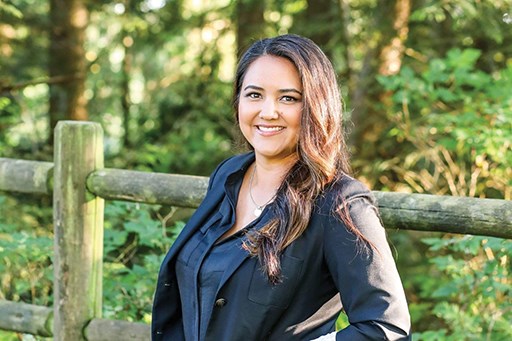A shíshálh Nation woman has been awarded a grant to research the health-care system’s response to COVID-19 for Vancouver’s urban Indigenous population.
Brittany Bingham recently became the first Indigenous PhD graduate from Simon Fraser University’s faculty of health sciences, and her earlier research and PhD involved community-based projects and the incorporation of methods that draw on Indigenous culture.
The Michael Smith Foundation for Health Research, which is funding the project, describes it as “a community-driven approach to examine patient data … along with the advice of key urban Indigenous community organizations and stakeholders,” with the end goal of coming up with recommendations “by and for the urban Indigenous community.”
Bingham told Coast Reporter the research team she’ll be leading will work closely with community organizations and First Nations in the Vancouver area to try to identify gaps or potential areas of risk for the Indigenous population and “very quickly gather information that can inform recommendations for what we need to do going forward this fall, winter and for this coming year.”
“There are approaches to research where the researchers just examine the data, and then put out the information,” she said. “We're going to get advice from the community experts on what data is important, what should we be looking at and what they need to inform their work with the community.”
Bingham said with the pandemic still ongoing, how researchers work with those community groups will be different than it would have been in the past.
“The main challenge is the approach to engaging with communities,” she said. “Typically we’re meeting with people in person and having that face-to-face approach. Now we have to be do things more virtually and transitioning to that virtual research environment is a bit of a challenge, but it’s been going well so far.”
Bingham said that although the project will focus on Vancouver’s urban Indigenous population she expects much of what they learn will be applicable to rural areas that include First Nations, like the Sunshine Coast, and more remote Indigenous communities.
“I think that the key is that we need to incorporate Indigenous community expertise into the research and into the recommendations that we're making and there may be unique context to Indigenous communities that needs to be taken into consideration in a COVID response.”
While completing her PhD, Bingham also worked with Fraser Health and Vancouver Coastal Health (VCH) researching cultural safety and primary care, and with the Centre for Gender and Sexual Health Equity. She’ll be continuing that work as the newly-appointed director of Indigenous Research at VCH Aboriginal Health and the Centre.
In a release announcing her appointment, Bingham said, “This joint role will enable our research teams to collaborate on community-driven research that is directly responsive to international and national calls to action and justice for Indigenous peoples health and develop recommendations for achieving health equity for Indigenous peoples, with a particular focus on Indigenous women’s wellness.”
Bingham told Coast Reporter that as well as the support of her family as she worked to complete her PhD and continue her other work and research, she’s had a lot of support from the shíshálh Nation.
“I'm a really proud member of the shíshálh Nation and they’ve been very supportive of me in this academic journey,” she said. “I'm very thankful for that.”



